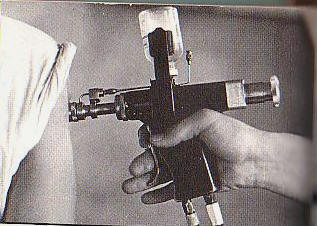|
|
||||||||||||||||||||||||||||||||||||||||||||||||||||||||||||||||||||||||||||||||||||||||||||||||||||||||||||||||||||||||||||||||||||
|
|
||||||||||||||||||||||||||||||||||||||||||||||||||||||||||||||||||||||||||||||||||||||||||||||||||||||||||||||||||||||||||||||||||||
|
The description below provoked a response to debunk the reported low numbers
of how many Veterans in VA care are treated for HCV disease. More
Information 88% of US
military veterans with HCV are not treated
Hepatitis C Translating Initiatives for
Depression Into Effective Solutions (HEPTIDES)
This study is currently recruiting participants.
Verified November 2012
by Department of Veterans Affairs
http://clinicaltrials.gov/ct2/bye/DQoPWw4lZX-i-iSxcBDxUd-BZ.
Sponsor:
Information provided by (Responsible Party):
Department of Veterans Affairs
ClinicalTrials.gov Identifier:
NCT01143896
First received: June 11, 2010
Last updated: November 1, 2012
Last verified: November 2012
Chronic infection with hepatitis C (CHC) is a common and expensive condition, and it disproportionately affects veterans. Treatment with antiviral therapy reduces liver disease progression and improves health related quality of life. However, ~70% of veterans with CHC are considered ineligible for antiviral treatment. Most of these patients are excluded due to the presence of co-existing depression and substance use. The proposed project will adapt and adopt an evidence-based collaborative depression care model in CHC clinics. By removing the leading contraindication for antiviral treatment, this project will potentially yield benefits that go far beyond the obvious quality of life benefit from antidepressant therapy itself.
Resource links provided by NLM:
Further study details as provided by Department of Veterans
Affairs:
Primary Outcome Measures:
Secondary Outcome Measures:
Detailed Description: Project Background and Rationale: Depression is highly prevalent, yet under-diagnosed and under-treated in CHC. Treatment models that increase collaborative management of depression by mental health and physical health clinicians can improve quality and outcomes, and collaborative care models have been identified as the best-practice for depression in VA primary care settings. However, the antiviral treatment for CHC patients may not benefit from the existing primary care-mental health integration because the antiviral treatment is time-limited and conducted in specialty clinics. Although there is little evidence evaluating the effects of collaborative depression care in specialty settings, QUERI HIV-hepatitis initiated one of the first such efforts that effectively implemented collaborative depression care in HIV clinics. Built on this experience, an intensive yet focused collaborative care model in CHC clinics may be effective in improving not only depression but also CHC care. This proposed study, "Hepatitis-Translating Initiatives for Depression into Effective Solutions (HEP-TIDES)" will target this issue. Project Objectives: The proposal has three overarching primary aims and one exploratory aim. The primary aims are (1) adapt and adopt the collaborative care model for improving depression care in specialty CHC care settings, (2) compare the effectiveness of HEP-TIDES to usual care in improving CHC care, and (3) compare the effectiveness of HEP-TIDES to usual care in improving depression care. The exploratory aim is to evaluate the cost-effectiveness of HEP-TIDES versus usual care. Project Methods: HEP-TIDES is a multi-site, multi-method implementation project. HEP-TIDES will use evidence-based quality improvement (EBQI) methods to adapt and implement depression screening and the collaborative care model for depression in the CHC clinics at 4 disparate VA facilities (aim 1). HEP-TIDES will involve CHC and mental health providers working with an off-site depression care team comprised of a depression care nurse manager, pharmacist, and a psychiatrist. The purpose of the team will be to support CHC and mental health clinicians in delivering evidence-based stepped-care depression treatment. The adapted model will also take into account the substance use disorders among CHC patients. HEP-TIDES implementation will be assessed using a formative evaluation of the implementation process and a summative evaluation of a randomized controlled implementation trial of collaborative depression care in 268 patients (aims 2 and 3). Towards the end of the project we will evaluate the cost-effectiveness of HEP-TIDES defining incremental cost-effectiveness in terms of cost per additional CHC treatment initiation and cost per additional CHC treatment completion (exploratory aim).
Criteria
Inclusion Criteria:
Exclusion Criteria:
Please refer to this study by its ClinicalTrials.gov identifier:
NCT01143896
Contacts
Locations
Sponsors and Collaborators
Investigators
No publications provided
Keywords provided by Department of Veterans Affairs:
Additional relevant MeSH terms:
ClinicalTrials.gov processed this record on January 21, 2013 http://clinicaltrials.gov/ct2/show/NCT01143896
|
||||||||||||||||||||||||||||||||||||||||||||||||||||||||||||||||||||||||||||||||||||||||||||||||||||
|
|
|









